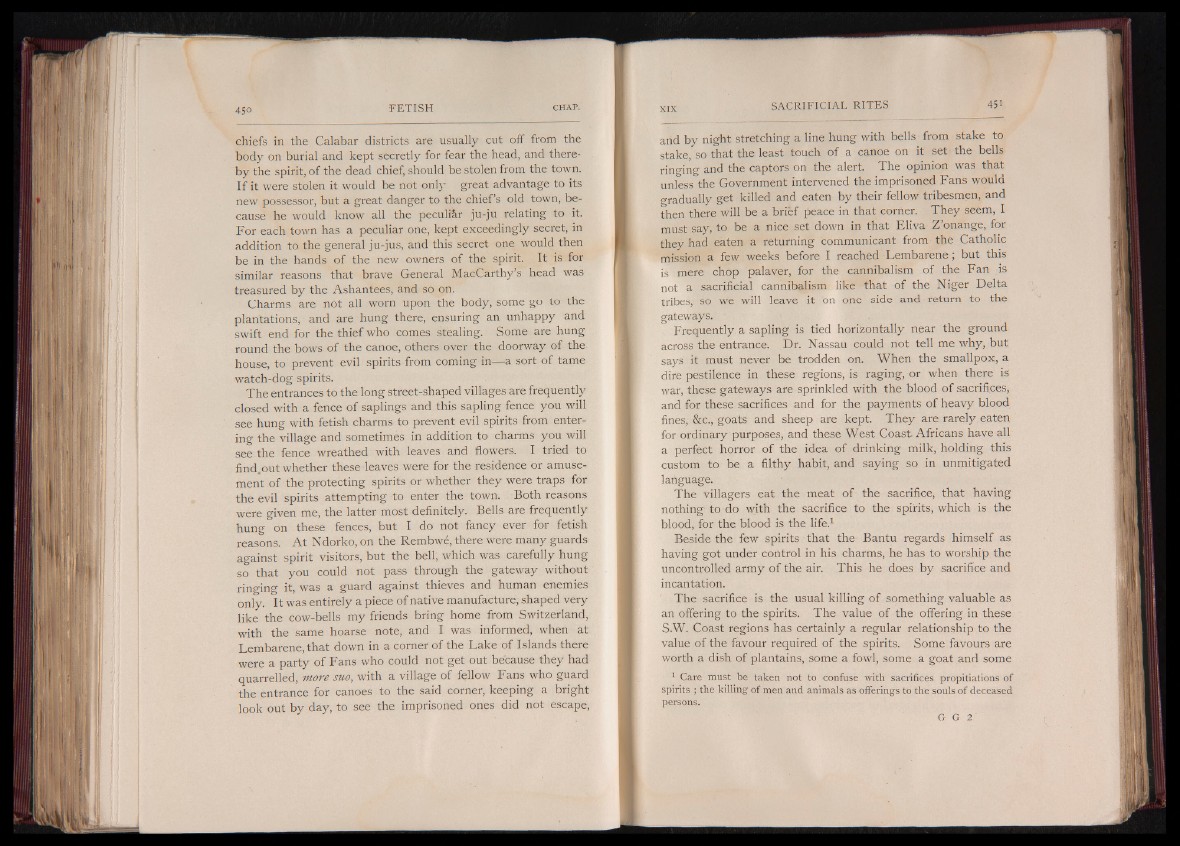
chiefs in the Calabar districts are usually cut off from the
body on burial and kept secretly for fear the head, and thereby
the spirit, of the dead chief, should be stolen from the town.
I f it were stolen it would be not only great advantage to its
new possessor, but a great danger to the chief’s old town, because
he would know all the peculiar ju-ju relating to it.
For each town has a peculiar one, kept exceedingly secret, in
addition to the general ju-jus, and this secret one would then
be in the hands of the new owners of the spirit. It is for
similar reasons that brave General MacCarthy’s head was
treasured by the Ashantees, and so on.
Charms are not all worn upon the body, some go to the
plantations, and are hung there, ensuring an unhappy and
swift end for the thief who comes stealing. Some are hung
round the bows of the canoe, others over the doorway of the
house, to prevent evil spirits from coming in— a sort of tame
watch-dog spirits.
The entrances to the long street-shaped villages are frequently
closed with a fence of saplings and this sapling fence you will
see hung with fetish charms to prevent evil spirits from entering
the village and sometimes in addition to charms you will
see the fence wreathed with leaves and flowers. I tried to
find.out whether these leaves were for the residence or amusement
of the protecting spirits or whether they were traps for
the evil spirits attempting to enter the town. Both reasons
were given me, the latter most definitely. Bells are frequently
hung on these fences, but I do not fancy ever for fetish
reasons. A t Ndorko, on the Rembwe, there were many guards
against spirit visitors, but the bell, which was carefully hung
so that you could not pass through the gateway without
ringing it, was a guard against thieves and human enemies
only. It was entirely a piece of native manufacture, shaped very
like the cow-bells my friends bring home from Switzerland,
with the same hoarse note, and I was informed, when at
Lembarene, that down in a corner of the Lake of Islands there
were a party of Fans who could not get out because they had
quarrelled, more suo, with a village of fellow Fans who guard
the entrance for canoes to the said corner, keeping a bright
look out by day, to see the imprisoned ones did not escape,
and by night stretching a line hung with bells from stake to
stake, so that the least touch of a canoe on it set the bells
ringing and the captors on the alert. The opinion was that
unless the Government intervened the imprisoned Fans would
gradually get killed and eaten by their fellow tribesmen, and
then there will be a brief peace in that corner. They seem, I
must say, to be a nice set down in that Eliva Z’onange, for
they had eaten a returning Communicant from the Catholic
mission a few weeks before I reached Lembarene; but this
is mere chop palaver, for the cannibalism of the Fan is
not a sacrificial cannibalism like that of the Niger Delta
tribes,* so we will leave it on one side and return to the
gateways.
Frequently a sapling is tied horizontally near the ground
across the entrance. Dr. Nassau could not tell me why, but
says it must never be trodden on. When the smallpox, a
dire pestilence in these regions, is raging, or when there is
war, these gateways are sprinkled with the blood of sacrifices,
and for these sacrifices and for the payments of heavy blood
fines, &c., goats and sheep are kept. They are rarely eaten
for ordinary purposes, and these West Coast. Africans have all
a perfect horror of the idea of drinking milk, holding this
custom to be a filthy habit, and saying so in unmitigated
language.
The villagers eat the meat of the sacrifice, that having
nothing to do with the sacrifice to the spirits, which is the
blood, for the blood is the life.1
Beside the few spirits that the Bantu regards himself as
having got under control in his charms, he has to worship the
uncontrolled army of the air. This he does by sacrifice and
incantation.
The sacrifice is the usual killing of something valuable as
an offering to the spirits. The value of the offering in these
S.W. Coast regions has certainly a regular relationship to the
value of the favour required of the spirits. Some favours are
worth a dish of plantains, some a fowl, some a goat and some
1 Care must be taken not to confuse with sacrifices propitiations of
spirits ; the killing of men and animals as offerings to the souls of deceased
persons.